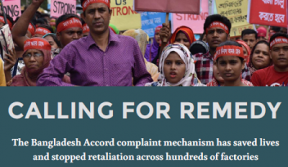Women are driving change, despite significant obstacles.
Since industrialization began, women have been exploited as a source of cheap labor for growing industries needing work in low-skilled, light manufacturing. Garments in particular have been a stepping stone industry, recruiting women to work outside the home. This tradition continues today in export processing zones (EPZs) throughout Asia, Latin America and Sub-Saharan Africa, where women comprise between 70-90% of the labor force. They produce not only garments, but agricultural products, electronics, and many of the household goods we purchase today. Women’s rights are routinely denied in these factories. These women workers are subject to physical and sexual harassment on the job, forced pregnancy tests, and gender-based discrimination in addition to more general workplace abuses like wage theft and bans on unionization.
Though these jobs have given women certain levels of financial independence they did not have before, the wages have remained low and opportunities to advance skills few. Other problems quickly emerge, including:
- Women’s role at work changed but their role in society remained subservient, creating expectations they work day night;
- Increased rates of violence against women;
- More single-women headed households lacking a male counterpart; and
- Youth violence emerging as a result of idle youth with too little parental guidance.
These problems, however, are not a result of women entering the workforce, rather a symptom of the inequality that already existed and shifting expectations both of and from women. Women who work are less dependent on husbands, and thus more able to assert their rights within the home. Similarly, women who have access to quality education, labor unions, and a variety of opportunities for work are less dependent on their employer and more able to assert their rights on the job.
Unfortunately, these factors are often not present for women. Three international agreements have been put in place to protect the rights of female workers: ILO Equal Remuneration Convention (No. 100), Discrimination of Employment (No. 111), and Maternity Protection Convention (No. 183). But implementation of these conventions is mixed at best, and social conventions still disempower women in many countries. It’s still legal to discriminate against women in many parts of the world and even when women are equal under the law, the reality is often quite different.
Women also have a tradition of leading the way for change to address these issues. In March 1911, a fire broke out on the top floors of the Triangle Shirtwaist factory in New York. Of the 500 workers at the factory—mostly young women—146 died. They inspired a movement, however, that brought together suffragettes, women trade unionists and other concerned activists to create more just labor standards in the United States. A similar situation exists today in Bangladesh, and ILRF is committed to turning these tragedies into opportunity for much-needed labor reforms that lift up the voice of workers in their jobs, at the homes, and in their communities.

